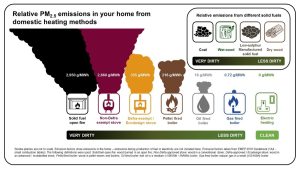Open fires and wood-burning stoves have risen in popularity over recent years. Stoves are now an additional form of heating for many households in both urban and rural areas; for a minority of people they may be their sole heat source.
Not all forms of domestic burning are equally polluting. The level of pollution produced can be affected by how well the stove or fireplace is used and maintained and what fuels are burnt.
If you own a stove you can take simple steps to limit pollution from it. Using cleaner fuels in a cleaner appliance installed by a competent person, knowing how to operate it efficiently, and ensuring that chimneys are regularly swept, will all make a big difference.
DEFRA has simple guidance for people that need to use wood burning stoves or open fires to help reduce the environmental and health impacts of their burning. – Open Fires and Wood-Burning Stoves: A Practical Guide
If using your stove or fire is the only way you can afford to keep warm:
- Try to use smokeless fuel and season any wood you use as much as possible and follow the guidance on the best wood to use.
- Talk to your neighbours. Be aware that burning long and slow is most polluting. You may feel you have no choice but to do this – but if you can avoid it, then do.
- If you own your home, consider whether you can remove the stove or open fire when you move.
For more information on what you can do please go to the Clean Air for Bristol FAQ:
https://www.cleanairforbristol.org/slow-the-smoke/what-can-i-do/

Source (UK Government Clean Air Strategy, 2019)
